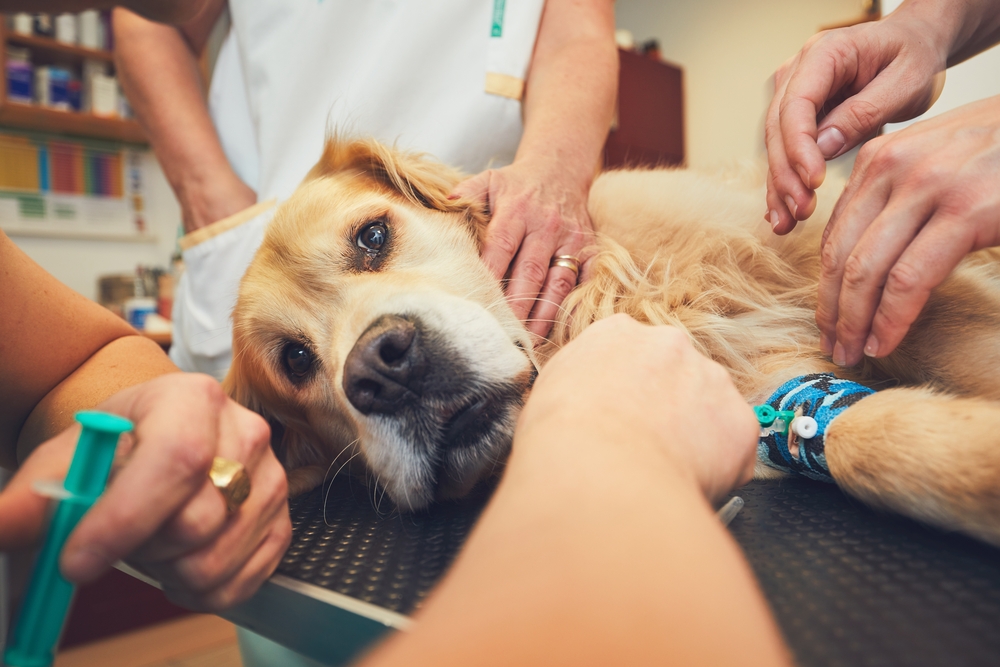Allergies are common in pets, and your furry pal can be hypersensitive to many substances. A pet’s allergic reaction can range from mild to life-threatening. Read our Juanita Hills Animal Hospital team’s guide to pets allergies and learn how to spot your furry pal’s allergic reaction signs, which can help prevent them from experiencing significant discomfort, and in some cases, potentially save their life.
Causes of allergic reactions in pets
Your pet can be allergic to virtually anything, so determining their reaction’s trigger (i.e., allergen) can be a real challenge. However, keep your eye out for a pattern such as if your pet always becomes itchy after rolling in the grass, developing a flea infestation, or eating chicken. Some of pets’ most common allergens include:
- Flea bites
- Biting or stinging insects (e.g., ants, flies, bees, mosquitoes)
- Grass, weed, and tree pollens
- Mold spores
- House and dust mites
- Pet dander
- Fabrics
- Plastics
- Cleaning products
- Air fresheners and perfumes
- Shampoos and other topical treatments
- Foods (e.g., chicken, lamb, beef, eggs, soy, dairy, wheat)
- Prescription medications
Signs of allergic reactions in pets
Allergic reactions can vary greatly in severity, but they typically worsen over time with repeated allergen exposure. Pets’ allergy signs typically manifest as skin itchiness. Depending on the allergen, skin irritation and inflammation can occur in a specific spot on your pet’s body, or develop as generalized discomfort. Pets’ mild to moderate allergic reactions can cause:
- Reddened, inflamed skin
- Scratching, licking, chewing, and rubbing at itchy areas
- Hives
- Hair loss
- Thickened skin caused by chronic inflammation
- Skin infections
- Hotspots
- Ear inflammation and infections
- Anal gland inflammation and impaction
In some cases, allergic reactions can be severe and develop suddenly. For example, if your pet reacts to a vaccine or a medication administered under the skin, in the muscle, or in the vein, they can develop an anaphylactic reaction. A pet’s anaphylaxis signs can include:
- A swollen face or muzzle
- Excessive salivation
- Vomiting
- Diarrhea
- Lethargy
- Difficulty breathing
- Brick-red gums
- Collapse
- Seizure
A systemic anaphylactic reaction is a life-threatening emergency that requires immediate veterinary treatment. Therefore, if your pet begins exhibiting allergic reaction signs, monitor them closely for anaphylaxis.
At-home treatment of allergic reactions in pets
Depending on the cause, location, and severity of your pet’s allergic reaction, you should be able to treat them at home effectively if their signs are mild or moderate. To minimize and limit your pet’s allergic reactions, prevent them from coming in contact with their known allergens.
If your pet is itchy, or suffering from skin inflammation and irritation, you can begin by treating them at home. Try the following allergy treatments:
- Diet change — Switching your pet’s diet to a limited-ingredient option that includes few known food allergens may help reduce their itching. However, a diet rich in essential fatty acids and key vitamins and minerals can improve skin health.
- Supplements — Omega-3 fatty acids, biotin, colostrum, vitamin C, bioflavonoids, probiotics, and quercetin are included in many popular pet skin health supplements. These supplements help strengthen the skin barrier and boost overall skin health.
- Shampoos — Soap-free shampoos can strip allergens from your pet’s skin without removing healthy oils, reducing itching and irritation. Use a product that is specifically designed for pets with allergies.
- Anti-itch medications — While corticosteroids can reduce your pet’s itching, these medications should not be used long term because of their adverse side effects. Other medications, such as oclacitinib (i.e., Apoquel), only target a pet’s itch response, rather than suppressing their entire immune system, and are exceptionally effective.
- Immunotherapy — Immunotherapy is essentially a vaccination for your pet’s allergies. These injections reduce your pet’s immune response to their allergens by desensitizing the immune system.
For pets suffering from an acute allergic reaction, such as a bee sting or vaccination, antihistamines may be warranted. An antihistamine, such as diphenhydramine (i.e., Benadryl), can halt the allergic response and ease itching, hives, and wheals. However, antihistamines are not effective for all allergic reactions, and they can potentially cause unwanted side effects. Before administering an antihistamine or cortisone cream for your pet’s allergic reaction, contact our Juanita Hills Animal Hospital team for guidance.
Emergency veterinary treatment for allergic reactions in pets

Severe anaphylactic reactions require emergency veterinary treatment for the best prognosis. When your pet arrives at Juanita Hills Animal Hospital, we will immediately assess their condition, providing lifesaving care such as airway and cardiovascular support. If possible, we will remove the allergen from your pet’s skin or bloodstream, whether it’s a bee stinger or a chemical, and administer emergency medications if necessary. We will monitor your pet around-the-clock, adjusting their treatment plan as needed for the best possible outcome, so your furry pal can return home to you as quickly as possible.
If your pet has been bitten or stung, or come in contact with a substance that is causing an allergic reaction, don’t wait to see if their condition improves on its own. Some allergic reactions can develop into anaphylactic shock, so contact our Juanita Hills Animal Hospital team for help if your furry pal appears to be having a reaction.



















Leave A Comment